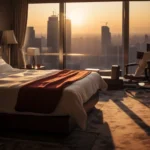Discover the charm of one of Beijing’s most scenic spots with ‘How to Visit Shichahai – A Complete Guide.’ This comprehensive guide offers everything you need to know, from historical highlights to the best ways to explore Shichahai’s picturesque lakes and alleys. Whether you’re a first-time visitor or a seasoned traveler, this guide will help you navigate Shichahai with ease
1. The History of Shichahai
Now mainly composed of the three-lake area – Back Sea ( Houhai), Qianhai Sea and Xihai Sea, Shichahai’s roots extend deep into Beijing’s historical tapestry. The area’s name, translating to ‘Ten Temple Lake’, is a testament to the numerous temples once dotting its shores. These lakes formed over 800 years ago during the Yuan Dynasty (1271 to 1368), becoming a part of the grand canal system that coursed through ancient Beijing.
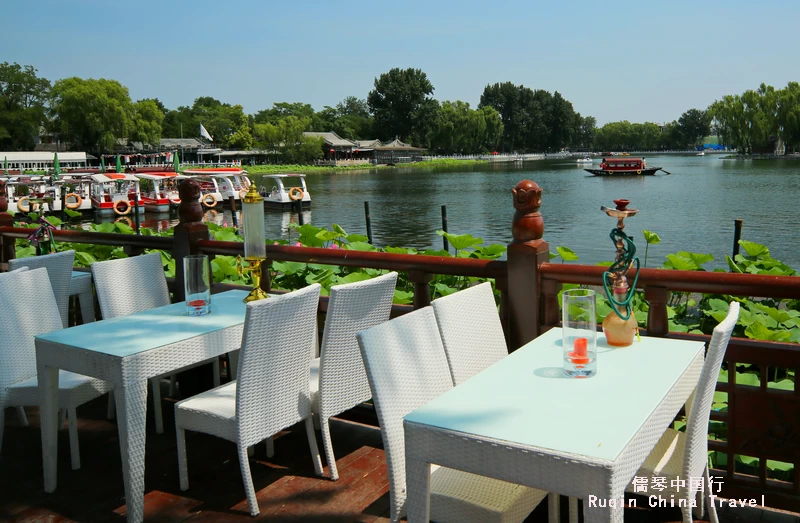
Over centuries, Shichahai evolved from a royal aquatic playground to a bustling hub of culture and commerce. Its waters have mirrored the city’s transformation, witnessing the rise and fall of dynasties. Today, remnants of this illustrious past, like the Guangji Temple and the Huoshen Temple, stand as silent sentinels, embodying the area’s enduring spiritual significance.
2. Shichahai Location in Beijing
Shichahai is located in the heart of Beijing, just north of the Beihai Park. It’s a historic area known for its three interconnected lakes: Qianhai, Houhai, and Xihai. The neighborhood is surrounded by traditional hutongs (alleyways) and is famous for its beautiful scenery, historical significance, and lively nightlife.
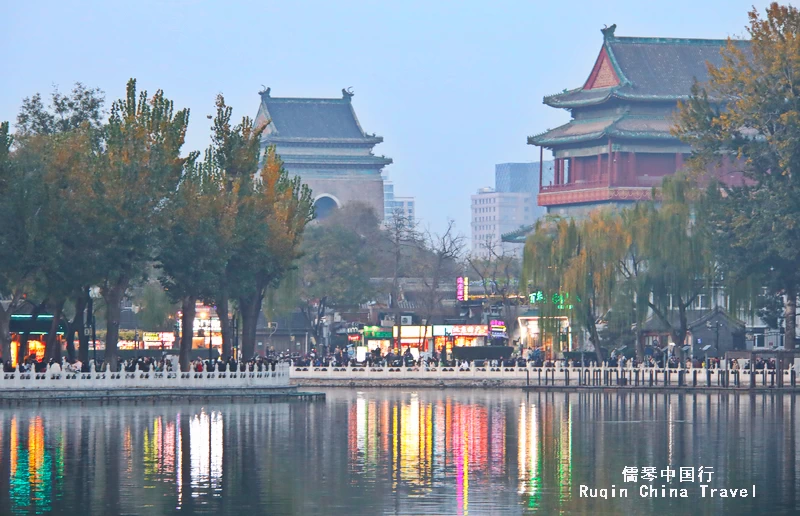
Shichahai lies within the Xicheng District, offering easy access to other iconic attractions such as the Bell and Drum Towers, Prince Gong’s Mansion, and Nanluogu Xiang. It’s also close to the central business and tourist areas of Beijing, making it a popular spot for both locals and visitors.
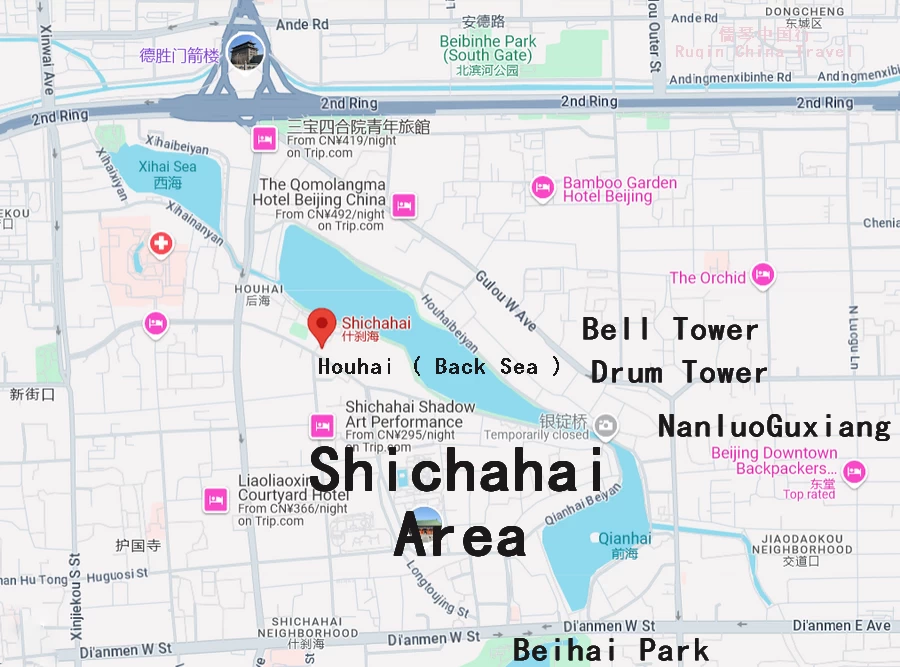
The area is a short distance from subway stations like Shichahai Station (Line 8) and Nanluogu Xiang Station (Line 6), allowing convenient access by public transport. Whether you’re visiting for a peaceful walk around the lakes or exploring the nearby alleys, Shichahai is a must-visit destination in Beijing.
3. How to Get to Shichahai in Beijing
To reach Shichahai in Beijing, the subway is a convenient option. You can take Subway Line 8 directly to Shichahai Station and use Exit A2 or A1. From there, it’s just a short walk to the scenic lakes and attractions.
Alternatively, you can take Subway Line 6 to Nanluogu Xiang Station. From Exit E, it’s a pleasant 15-20 minute walk to Shichahai. This route allows you to explore Nanluogu Xiang’s famous hutongs and lively atmosphere along the way, making it an enjoyable stroll before reaching Shichahai.
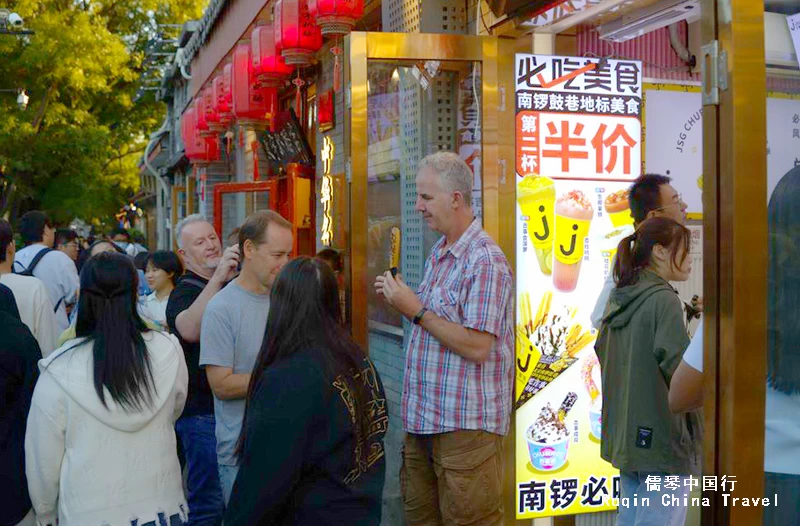
Both subway lines are well-connected to the rest of Beijing, offering affordable and efficient travel. Whether you choose Line 8 for a direct route or Line 6 for a more scenic walk, the subway ensures you’ll avoid traffic and enjoy a smooth journey to Shichahai.
4. Discovering Traditional Beijing
In the labyrinthine alleys of Shichahai, the essence of traditional Beijing is palpably alive. The Hutong system, a network of narrow lanes formed during the Yuan Dynasty, cradles centuries-old Siheyuan (courtyard houses), where generations of Beijingers have lived.
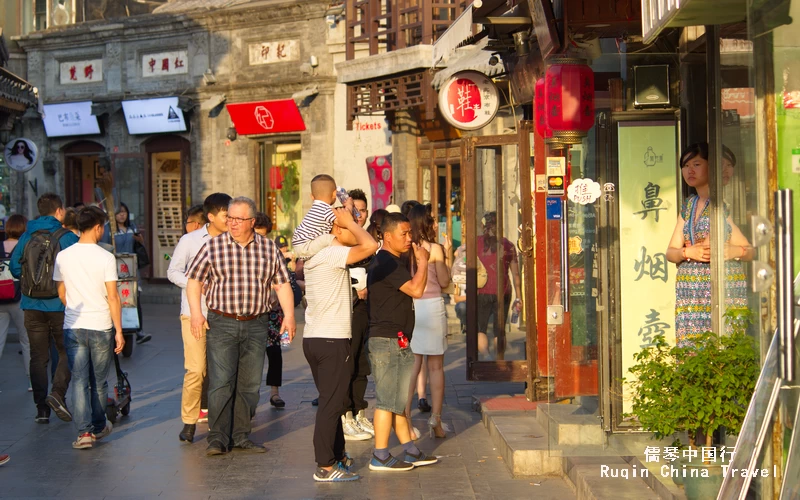
Walking through these Hutongs, one encounters a living museum of Beijing’s architectural heritage, with residences like the Prince Gong’s Mansion and Prince Chun’s Palace offering glimpses into the opulent lives of past nobility.
This area, however, is not just about grandeur; it’s about the ordinary yet captivating daily life of locals. Early mornings in Shichahai are a time machine to old Beijing — elderly residents practicing Tai Chi by the lakeside, vendors setting up their stalls, and the aroma of traditional Beijing snacks wafting through the air. It’s a rare, unfiltered view into the rhythms and rituals of a Beijing that balances modernity with a deep reverence for its past.
5. Top Attractions and Activities in Shichahai
Shichahai is a treasure trove of attractions and activities that cater to a wide range of interests, blending historical sites with vibrant cultural experiences:
Historical Landmarks:
The area is dotted with significant historical sites. The Bell and Drum Towers, standing majestically near Shichahai, offer a glimpse into the timekeeping methods of ancient China. Prince Gong’s Mansion, an opulent complex, showcases the luxurious lifestyle of Qing Dynasty aristocrats.
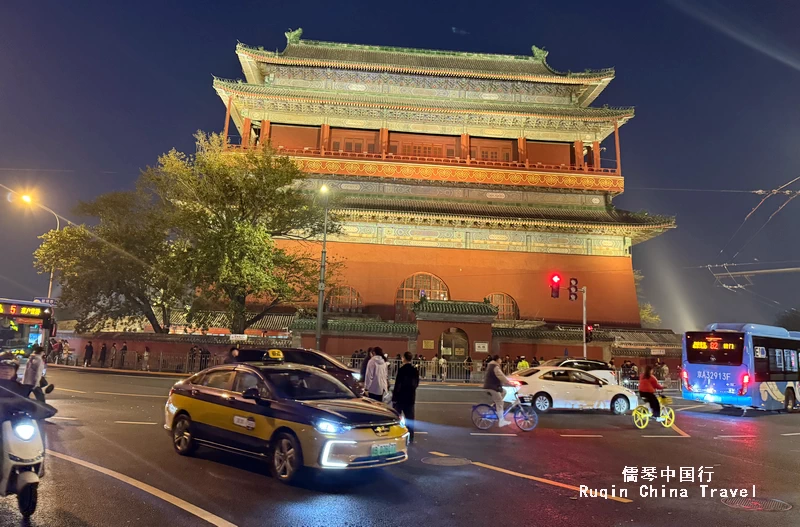
Cultural Immersion:
For a deep dive into local culture, visit the former residences of historical figures like Soong Ching Ling and Mei Lanfang. These homes not only highlight their former occupants’ lives but also serve as windows into Beijing’s rich cultural history.
Leisurely Exploration:
Strolling along Yandai Xiejie (Tobacco Pipe Lean Street) offers a quaint shopping experience, while the Silver Ingot Bridge provides stunning views of the lakes, especially at sunset.
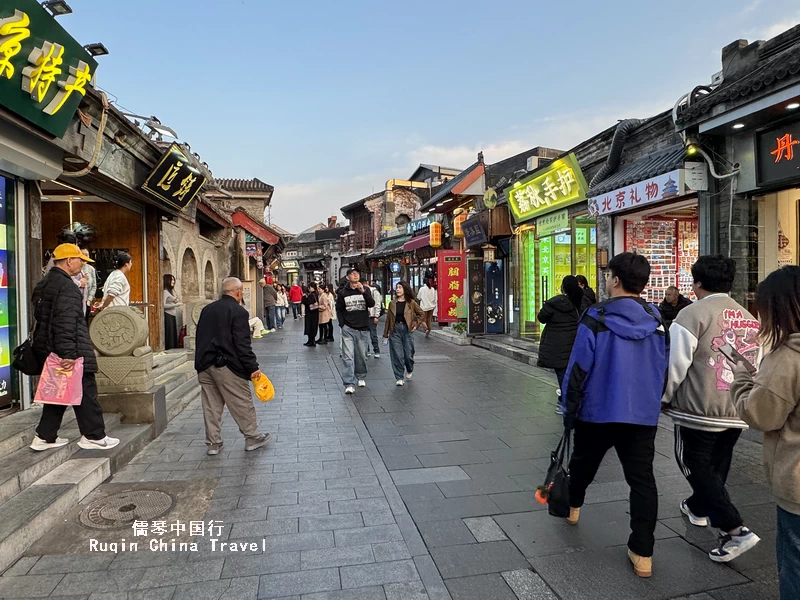
For those who enjoy a festive atmosphere, consider visiting Yandai Xiejie Street in the evening. The area lights up beautifully at night, and the nearby Houhai bar street becomes lively with music, giving the entire area a charming ambiance. Early mornings are perfect for travelers wanting a quieter experience, as you can avoid crowds and appreciate the architecture and atmosphere in a more peaceful setting.
Boat Cruising:
Rent a boat and gently paddle across the serene waters of Qianhai and Houhai, enjoying picturesque views of the surrounding traditional Hutongs and modern skyline.
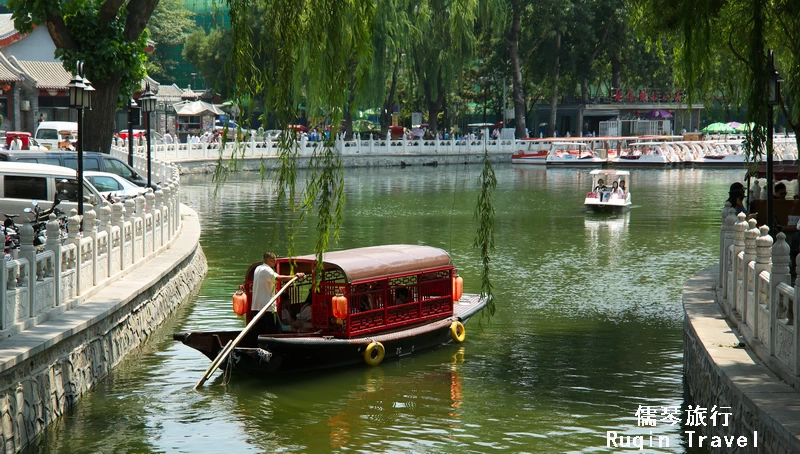
Rickshaw Tours:
A guided rickshaw ride through the winding Hutongs offers an intimate look at the area’s architectural charm and daily life.
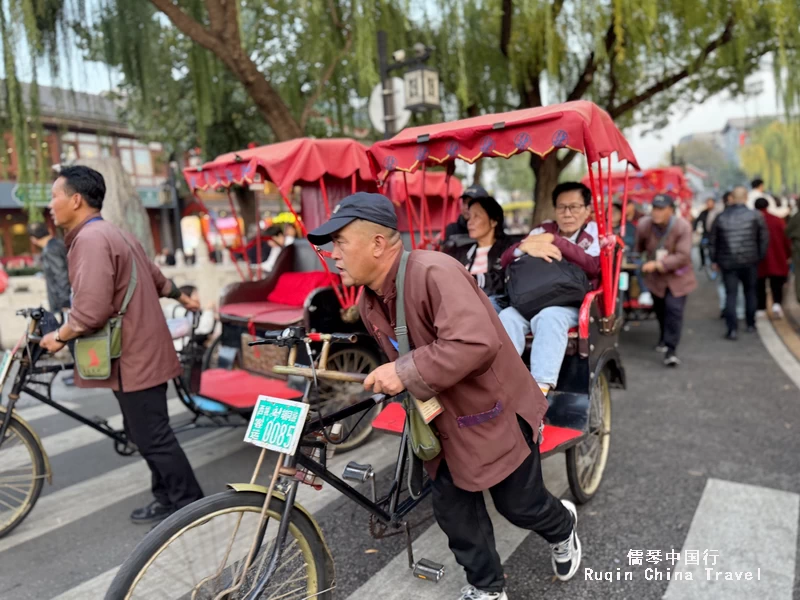
Seasonal Activities:
In winter, Houhai Lake transforms into a bustling ice-skating rink, while spring brings the beautiful blossoms around the lakes, perfect for leisurely walks.
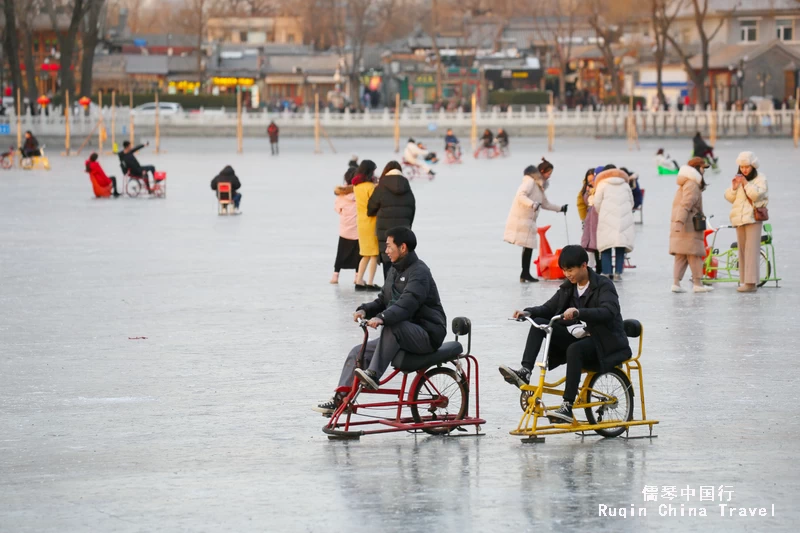
Evening Entertainment:
As night falls, Shichahai’s bars and restaurants come alive, offering a blend of traditional Chinese and modern entertainment, from live music to tea tasting sessions.
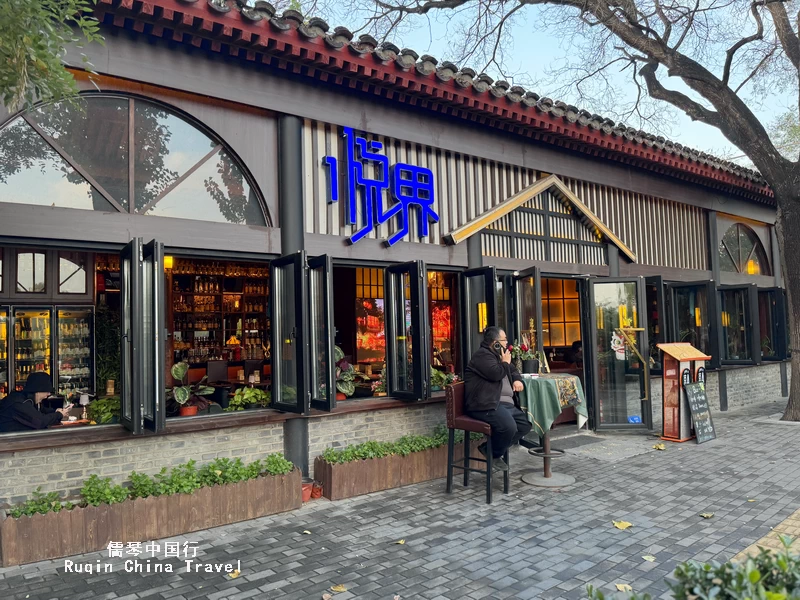
6. Experiencing Shichahai Through the Seasons
Shichahai’s beauty transcends seasons, each bringing its unique charm:
Spring:
The arrival of spring transforms Shichahai into a colorful canvas, with cherry and willow trees blossoming around the lakes. It’s a perfect time for leisurely strolls or boat rides, enjoying the refreshing warmth and vibrant hues.
Summer:
Summer in Shichahai is lively and energetic. The lakes become a hub for water activities, including boating and fishing. Evening walks are particularly delightful, with the area illuminated by the soft glow of lanterns and the buzz of lively outdoor eateries.
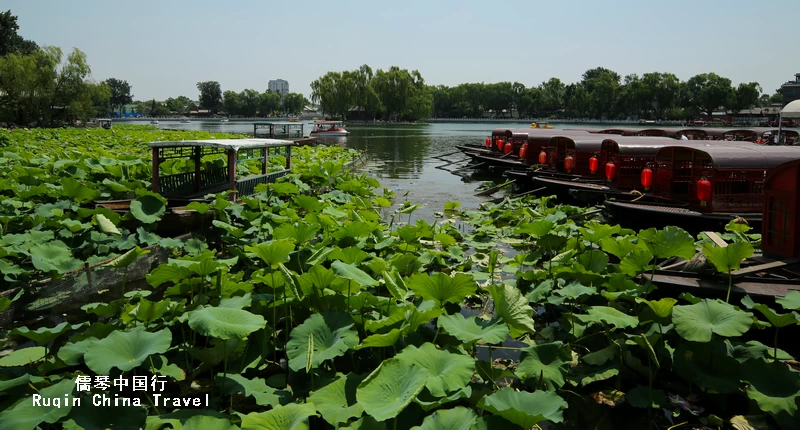
Autumn:
Autumn cloaks Shichahai in a tranquil ambience, with golden leaves floating on the lakes’ surfaces. The cooler temperatures make it ideal for exploring the Hutongs and enjoying traditional Beijing snacks from local vendors.
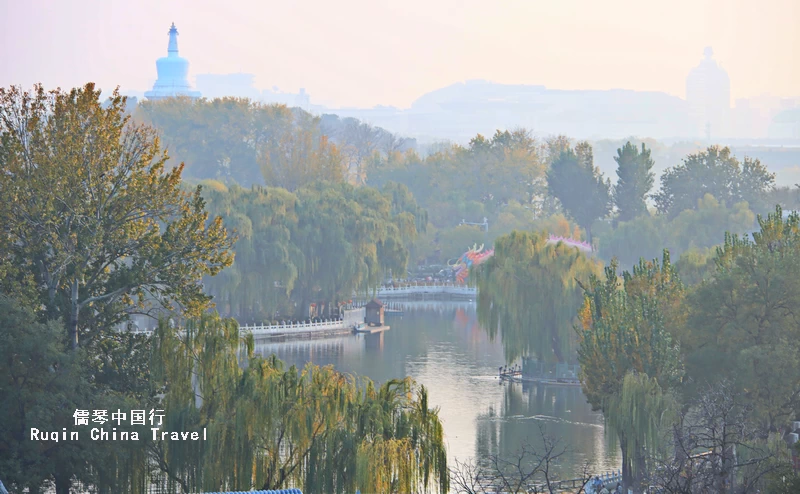
Winter:
Winter turns Shichahai into a wonderland, especially when Houhai Lake freezes over for ice skating. The crisp air and fewer crowds make it a serene season for exploring the historical landmarks and warming up in cozy tea houses.
Each season at Shichahai offers distinct experiences, making it a year-round destination for visitors.
7. Practical Tips and Transportation
Navigating Shichahai can be a delightful experience with these practical tips:
Avoiding Scams:
Be cautious of overpriced rickshaw tours and tea house scams. It’s advisable to agree on prices beforehand and be wary of unsolicited invitations to special events or tea tastings.
Transportation:
The most convenient way to reach Shichahai is via subway. Take Line 6 and alight at Beihai North Station, then enjoy a short walk to the lakes. Buses 5, 60, 107, 108, and 111 are also viable options, dropping you near major entrances.
Best Time to Visit:
Early mornings offer tranquility, while evenings are perfect for experiencing the vibrant nightlife. Weekdays are less crowded than weekends.
Local Etiquette:
Respect the local culture and privacy of residents, especially when photographing in the Hutongs.
Footwear:
Comfortable walking shoes are a must, as exploring Shichahai involves considerable walking.
With these tips, your visit to Shichahai will be both enjoyable and hassle-free.
8. Dining and Nightlife in Shichahai
Shichahai is not just a historical marvel; it’s a culinary and nightlife destination. The area offers a diverse array of dining options:
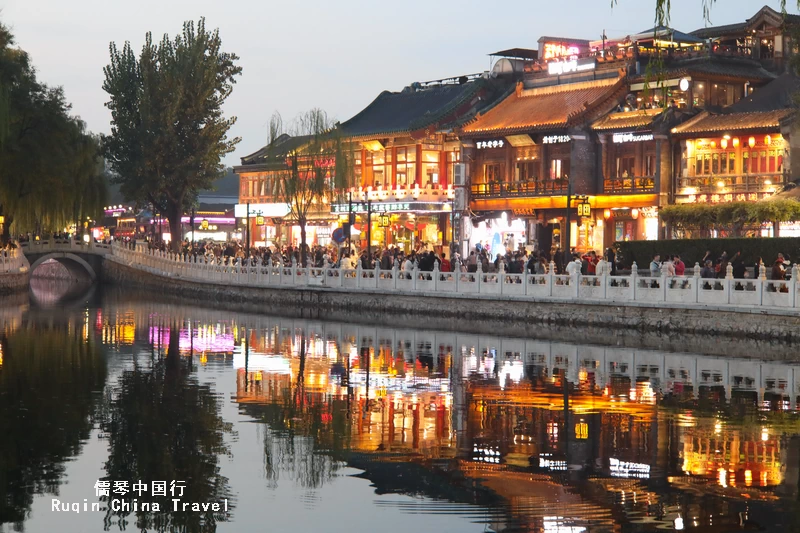
Traditional Beijing Cuisine:
Sample classic dishes at time-honored establishments. The must-try includes succulent Peking Duck, flavorful Zhajiangmian (noodles with bean paste), and hearty Mongolian hotpot.
Street Food Delights:
The streets around Shichahai brim with vendors offering local snacks like sugar-coated haws on a stick and savory rou jia mo (Chinese hamburger).
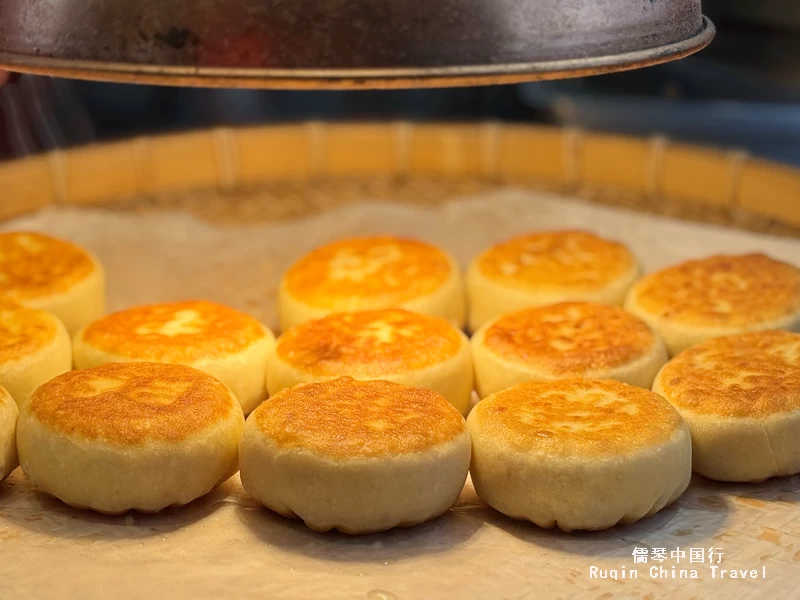
Lakeside Bars and Cafes:
As the sun sets, the lakeside area transforms into a lively social hub. Chic bars and cafes offer everything from traditional Chinese teas to craft cocktails, often accompanied by live music or performances.
Nightlife:
For those seeking a vibrant nightlife, Shichahai doesn’t disappoint. The area buzzes with energy, hosting a variety of bars and clubs that blend traditional Chinese aesthetics with contemporary trends.
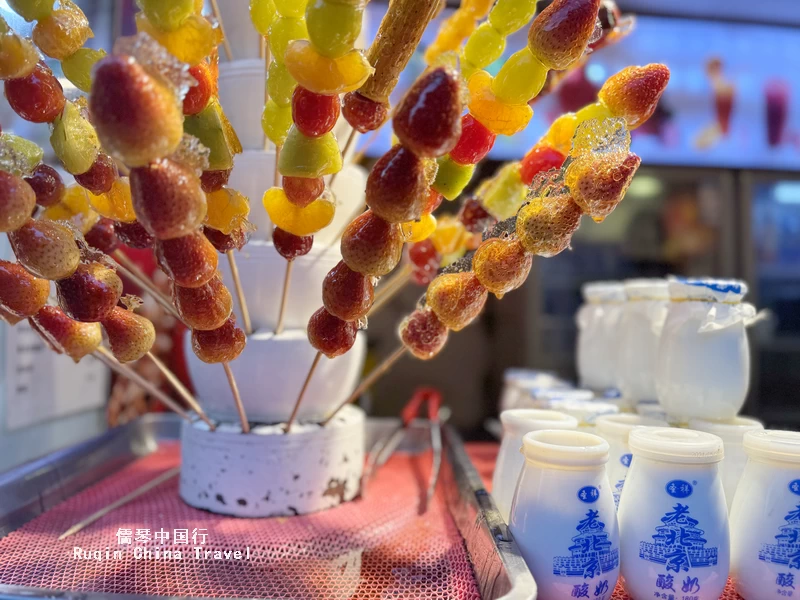
Whether you’re a food enthusiast or a night owl, Shichahai’s dining and nightlife scene promises a memorable experience.
9. Nearby Attractions
Confucian Temple and the Imperial College Museum: Dive into China’s educational heritage.
Lama Temple: Explore this renowned Tibetan Buddhist temple.
Ditan Park: A perfect spot for a peaceful retreat.
Beihai Park: Discover imperial gardens and historical architecture.
Forbidden City: A must-visit for its rich history and grandeur.
These nearby attractions perfectly complement a visit to Shichahai, offering a holistic Beijing cultural experience.
🍺 Beijing Hutong Walking Food and Beer Tour at Hidden Restaurants
Discover the rich flavors of Beijing’s traditional hutong alleyways on this small-group walking food tour. Led by a local guide, you’ll explore charming courtyards and narrow lanes while sampling authentic dishes at hidden family-run restaurants and local homes you’d never find on your own.
Feast on Beijing favorites like hotpot, hand-pulled noodles, beef buns, and spring pancakes. As you eat, enjoy unlimited local beer and dive into the stories behind each dish. The tour also includes a stop at a cozy craft brewery to cap off your culinary adventure. Come hungry—you’ll leave full and happy!
👉 Book Your Shichahai Hutong Food Tour Now!
Highlights:
• Explore the historic hutong alleys through local flavors
• Dine at hidden restaurants and authentic family homes
• Enjoy unlimited beer and a tasting at a local brewery
• Small-group experience with 12 travelers or fewer
In conclusion, Shichahai is a must-visit destination for anyone exploring Beijing, offering a unique blend of natural beauty, historical landmarks, and vibrant culture. By following ‘How to Visit Shichahai – A Complete Guide,’ you’ll have all the insights and tips needed to make the most of your visit. Whether you enjoy leisurely walks, boat rides, or discovering hidden gems, this guide ensures a memorable experience at Shichahai.”
More Beijing Travel Guides
Planning your Beijing tour? Our “Beijing Travel Guide“ section offers essential advice to help you navigate the city like a pro. From transportation tips and local customs to insider recommendations for hidden gems, these travel tips will ensure you have a smooth, enjoyable, and unforgettable experience in China’s vibrant capital. Let us guide you through the best practices for exploring Beijing with confidence!


